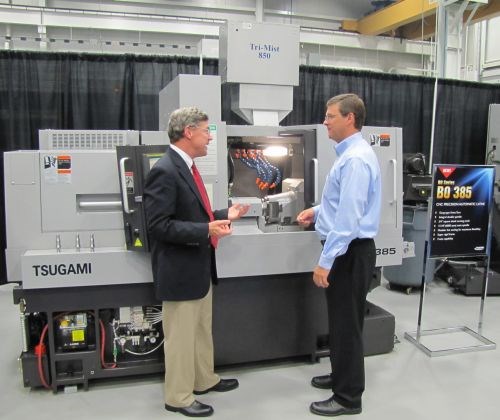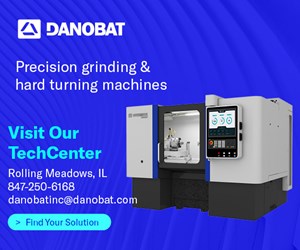MMS Editor-in-Chief Mark Albert spoke to Brad Morris at the 70th anniversary celebration of the company’s founding in Windsor, Connecticut.
Robert E. Morris and his wife Dorothy founded The Robert. E. Morris Company 70 years ago as a machine-tool dealer serving the New England area. His son, Lee B. Morris, and now his grandson, Brad Morris, have followed as the business leaders heading what has become a group of 13 operating companies, all serving the metalworking industry in various regional and national capacities.
Last week, the anniversary of the company’s founding was celebrated at its corporate headquarters in Windsor, Connecticut. The three-day event included tours of the facility, technical presentations, machine demos in the show room and a number of tabletop exhibits sponsored by partnering suppliers. I was fortunate to have the opportunity to spend a day as a guest at this event.
For me, one of the highlights was a spontaneous discussion with Brad Morris about the organization he now heads and its future. He said all the “right things.” By that, I mean his statements about the principles that have helped make the Morris Group successful are both sound and sincerely held. Any company that wants to survive and thrive into multiple generations as a family-run enterprise can find good advice in Brad’s comments.
For example, Brad opened the discussion by invoking what he honored as the essential “business culture” originally established by his grandfather. He cited integrity, honesty and hard work as the basis of this culture, a culture he feels must be sustained under his stewardship because these values are “the keys to customer service,” he said. Thereafter, he talked mostly about the company’s customers, not about the company.
“If you’re not continually finding new ways to add value to the customer, you’ll die,” he said, noting that the demanding realities of a dynamic and hard-pressed supply chain enforce this outlook. For the 13 companies under the Morris Group umbrella, Brad said that “all value is created at the point of contact with the customer.” For that overriding reason, customers are at the head of the list of stakeholders that the Morris Group exists to serve. The other stakeholders, as Brad prioritizes them, are employees, suppliers and owners—but these three are only served well if the customer is served well, he said.
This clear sense of purpose, Brad continued, is reflected in numerous ways. For one, it guides investment. “We invest differently. We have to save and invest so we can help our customers do more with less, with a distinct focus on the ‘do more’ part,” he said. He explained that short-term actions meant just to boost current revenues are pointless and counterproductive. Long-term efforts that enabled his group to expand its capacity to help customers find and apply the latest manufacturing technology are the only way to go, Brad told me.
For another, a customer-centric purpose reinforces the need for a consistent and engaged presence of top company management, he said. This, of course, is something he said he has to take to heart personally. He knows he can’t be a remote, hands-off business manager if the customer is really in charge.
Perhaps most importantly, he said, the sense of purpose has to mean “paying attention to everybody,” to use his words. “80 percent of our customers are owner-operated job shops. We have to serve them as well as our biggest technology buyers. There are no little guys.” In fact, he said one of his biggest concerns is that a customer might come to an open house event like the one under way and somehow feel neglected. He was clearly intent on making sure that didn’t happen (which is one reason he needed our conversation to be brief and to the point.)
We ended with my question about the one thing that stood out in his mind as he pondered taking over a leadership role. Admitting that this was a hard question to answer, Brad said he felt a deep sense of responsibility. Not only was he thinking of the families of the 400 or so employees in the Morris group, but he was also thinking of the families linked to the business success of his customers. “There has to be a passion behind what you do,” he said. “There’s no room for arrogance,” he concluded.









.png;maxWidth=300;quality=90)










